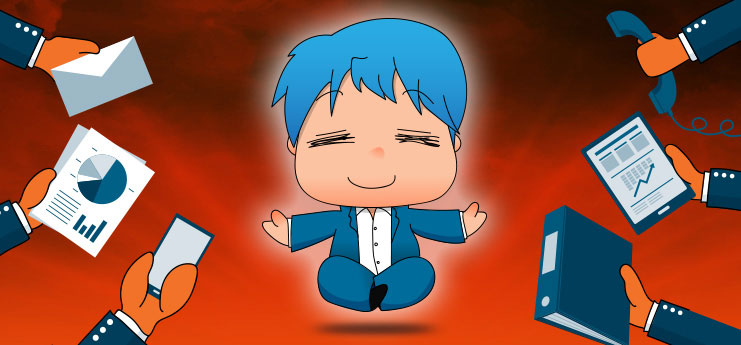 Every year, Indra Nooyi, the CEO of PepsiCo, sits down to write a letter… in fact, 400 of them. In each one, she tells the parents of her senior executives what their child is doing for the company, and why they are a gift to the company. The response from her colleagues: “This is the best thing that’s happened to my parents. And, it’s the best thing that’s happened to me!”
Every year, Indra Nooyi, the CEO of PepsiCo, sits down to write a letter… in fact, 400 of them. In each one, she tells the parents of her senior executives what their child is doing for the company, and why they are a gift to the company. The response from her colleagues: “This is the best thing that’s happened to my parents. And, it’s the best thing that’s happened to me!”
Needless to say, Nooyi is enjoying a high approval rating in her 11th year as CEO. Why is that? Daniel Goleman’s Emotional Intelligence (EI) theory would say it has everything to do with her mastering ‘the soft stuff’.
Before this new paradigm infiltrated business schools and boardrooms, strong leadership was top-down, empirical and calculated, emotionally invulnerable. Bedside manners and empathy were optional at best. But increasingly business is waking up to the idea that IQ and Ivy League-splattered résumés won’t necessarily translate into running a tight, productive, happy ship. It will take more intuitive, fluid forms of leadership that can leverage the power of human connections and the ability to inspire and envision others. If you want to build anything great, you’re going to have to get it the hard way. Soft skills are the hard skills inside the glass walls of today’s organisations.
EI: what exactly is it ‒ and isn’t it?
You only have to listen to Jeff Bezos’ quirky, self-deprecating laugh, or reference Mark Zuckerberg’s dress-down wardrobe, to agree that today’s best leaders are not gunning for super hero status. But their genius (aside from they’re genius) lies in the fact that they’re not trying. Where they’ve chosen to throw their weight is in their own emotional regulation‒the ability to recognise and tend to their emotional ‘tanks’‒so that they continue to model something sustainable and replicable to the organisation. More than a sunny disposition or extraverted confidence, EI is about discerning and managing your own emotions, so that you can nurture and develop the relationships around you.
And considering that teams are now far more agile and disparate, the ability to lead a diverse workforce is now indispensable. Vendors, freelancers, offshore teams and contractors sit around the same virtual tables these days, and today’s leader must have the empathy, communicative savvy and interpersonal skills to synthesise these contributions into a cohesive healthy brand.
Today, leaders are expected to go first‒to be transparent and approachable‒and to model teachability to their workforce. An emotionally intelligent leader turns mistakes into learning opportunities and operates within healthy boundaries of their finite capacity. Leaders who are emotionally self-regulated and self-aware know how to pause, think and step into another person’s shoes before acting. They know how to sniff out the needs of both colleague and customer. Those with high EQs know how to keep growing and learning and redefining their contribution to society, even as the business world is rampantly disrupted. And that’s how they keep winning.
EI has a tangible payoff
A TalentSmart study found emotional intelligence to be the number one predictor of performance (among 33 other qualities), with a 58% success rate for a variety of jobs overall. On average, people with a high EQ are $29 000 richer every year than people with a low EQ. Technically speaking, that means for every point you bring your EQ up, you can expect to make a thousand dollars more per year.
Even the US Air Force has punted the genius of emotional intelligence in resilience building. Attributes like assertiveness, empathy, happiness, and emotional self-awareness have become front and centre criteria in their recruitment process. So successful has been a strategy in streamlining the recruiter selection and incentive process that the Air Force has racked up an annual saving of $3 million over the past decade.
The list goes on. Hundreds of case studies highlight the direct link between EI and your bottom line. In fact, Travis Bradberry points out in his best-seller, Emotional Intelligence 2.0, “We haven’t yet been able to find a job in which performance and pay aren’t tied closely to emotional intelligence.”
How can I get more of it?
Unlike IQ which is fixed‒signed and sealed into your DNA‒emotional intelligence can grow with time. And what’s more, because EI is dynamic and responsive, a person can have an average IQ but outperform a colleague with a high IQ, 70% of the time. So, particularly for us not-quite-Einsteins in the room, how can we leverage the plasticity of emotional intelligence to stay inspired, self-motivated, and relevant in the field?
For one thing, we must get better at listening. It’s a rare but critical skill in the modern workplace. If leaders can learn how to get others talking and create safe, engaging environments where the smartest one in the room isn’t necessarily the highest paid, innovation will automatically pop. If empathy is an articulated goal, and we make it our aim to see the story from someone else’s side, we’ll sidestep a lot of time-and-energy-guzzling conflict. We’ll be able to relate better to our clients and teams. And, if we can get dead honest with our own strengths and weaknesses, we can most probably have the insight to tolerate others’ limitations and oversights.
The good thing is‒it’s never too late to grow up. If the world’s richest man can wash the dishes every night, we need to eat some humble pie when necessary and make the changes to reap a more fulfilling career and personal lifestyle. No leader, no matter how renowned, has it together on all fronts. Goleman reiterates this: “EI includes a broad spectrum of competencies, and no leader is A+ across the board—even the best has room to improve.”
So, it’s worth the asking today, what does your EI inventory look like? Maybe it’s time for a stocktake. EQ may not be everything but in the ever-changing world of future business, it’s the closest thing to ‘everything’ we got.
By Liam Hayes, Global Chief People Officer at Aurecon
This post originally appeared on Aurecon’s Just Imagine blog.


